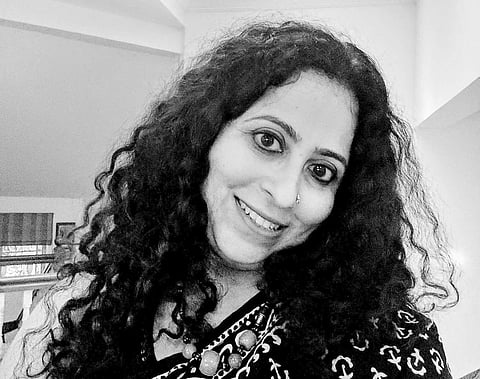

Anita Nair is a remarkable writer and a compelling storyteller. In her latest novel, Eating Wasps, she charts the tale of Sreelakshmi—a 35-year-old writer who takes her own life—and the women who touch her restless spirit, half a century after her demise, when her trapped soul is given release to wander in search of the stories that sustained her in life. It is a juicy premise, and in Nair’s hands it becomes something extraordinary, grabbing readers by the throat, plunging them into the depths of the feminine psyche with its myriad hues that run the gamut from the sublimely beautiful and inspiring to the sordid and shocking.
Flitting like a butterfly from one story to the other, Sreelakshmi and the reader get to know an array of memorable women. There is Urvashi who is a writer too and trapped within the confines of convention, struggling to find release for her nameless yearning, which prompts her to navigate the perils of a dating app that far from nourishing her with the fulfilment she seeks leaves her floundering in disappointment and worse. Little Megha is a precious ‘bommakutty’, doomed to discover that the monsters are real.
When her tormentor after pulling her into the back of a truck “pulled down the tarpaulin flap rolled up to the roof of the truck” it is hard to choke down the scream building at the back of the throat. Najma’s tale is a harrowing one as a stalker dashes her dreams with a horrifying acid attack, leaving her with little more than her embattled spirit and the steely will not to give in to her fears.
There are others who face the conundrum Sreelakshmi herself did—that of being damaged goods and the
girl who ate a wasp—especially when life serves up unhappy experiences to compound an already miserable existence: “Would you spit or swallow? Would you crumple or fight?”
The characters deal with the many headed hydra that is the internet which can label and shame one as ‘Pussy-mouth’ for a moment’s silly indiscretion, online stalking, body shaming, terrorism and the constant, grinding pressure to conform to societal norms be they ever so suffocating.
Nair has a gift for telling stories that boast of the robust prose, muscle and sinew favoured by the author in this tale as well. Her characters are delicately sketched out and pulse with life as they leap off the pages into the consciousness of those who have gotten to know them so intimately. Whether it is a hate-filled, nightmare of a blind sister who feeds on her younger sister like a parasite or even, the long-suffering mother of a disabled child, who is dangerously close to following through on her intention to take his life, these are folks who leave indelible imprints.
Ultimately though it is Sreelakshmi, who burrows into the head and heart with her tragic tale of discovery that, “Ghosts and writers are more alike than you think”.
‘All My Characters have Something of Me in Them’
Author Anita Nair tells Medha Dutta that she loves writing fiction and there is an inherent joy which bubbles forth when she is doing it.
Why wasps?
Eating Wasps is a metaphor referring to dealing with almost insurmountable challenges. How the metaphor came about has a story attached. I was working in an open verandah overlooking the wilderness we euphemistically call a garden in my cottage in Kerala. A wasp settled on a corner of the table I was at. I have been stung by wasps several times so I didn’t dare move until it left. But the wasp continued to hover and I had no option but to sit there and slowly an idea for a metaphor began evolving in my head. I do think the wasp presented the metaphor to me.
Your writings cover a wide range of genres. How easy or difficult is it flitting between them?
Noir is the more demanding in terms of the research involved as I need to ensure that every detail isn’t a supposition and is factually accurate. However, it is my literary fiction that is more difficult to write as there is a need to plumb one’s own soul to confront one’s own darkness and monsters before all of it melds into a narrative that is high on the craft quotient too. Writing for children poses a different set of challenges. There is a need to think it through carefully especially in terms of the voice used.
Most writers draw from personal experience. Is there a certain autobiographical element in
your works too?
Like most writers, all my characters have something of me in them. A quirk or a point of view or a character flaw or a certain predilection for something. Similarly a personal experience would be the foundation for a specific event or situation in a book. But I wouldn’t model a character around me or bring in an experience precisely as it happened to me. I wouldn’t feel right about doing so.
Despite strong women characters in your books, you’ve never wanted to be termed a ‘feminist writer’. Why?
Two reasons: The themes I pick on to write about extend beyond the condition of women and I wouldn’t want to limit myself to feminism. Secondly, as a person and writer, I do not want to be pigeon-holed into a category.
What are you working on next?
I have the next Inspector Gowda in my head demanding to be written. I am also working on a children’s book which I had to stop mid-way. So I will resume that soon.
QUICK TAKES
One writer you admire.
Ian Rankin
Funniest question
someone asked you.
Are you wearing a wig?
A book you love re-reading.
Good Earth
Your favourite word.
Consequence
An over-rated author.
James Joyce